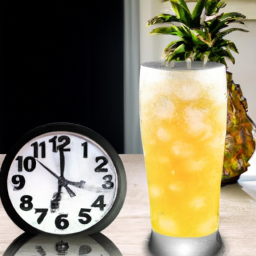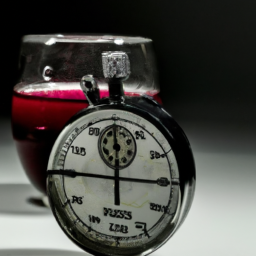As a pineapple juice enthusiast, I understand the importance of keeping it fresh and safe to drink. A common question is how long pineapple juice can sit out before going bad. It’s essential to answer this question to avoid health risks and a bad taste from drinking spoiled pineapple juice.
In this article, I will explore the factors that affect pineapple juice shelf life, how long it can sit out, signs that it has gone bad, and tips for storing it properly to keep it fresh as long as possible.
It is important to note that the shelf life of pineapple juice will vary depending on various factors, such as temperature, storage conditions, and whether it has been opened or not. Understanding these factors can help you make informed decisions about consuming or storing pineapple juice.
So, whether you are a health enthusiast, a juice lover, or just curious about the shelf life of pineapple juice, this article will provide you with all the information you need to know.
Key Takeaways
- Pineapple juice should not be left out for extended periods of time due to the risk of spoilage from exposure to air and temperature.
- The optimal storage conditions for pineapple juice are in a cool, dry place away from sunlight and heat, and refrigerating it once opened.
- Freezing can preserve pineapple juice for up to 8 months, but the quality may be compromised.
- Signs of spoiled pineapple juice include unpleasant odor, cloudiness, mold, and fizzy texture, and it should be properly disposed of to prevent health risks and environmental harm.
Factors that Affect Pineapple Juice Shelf Life
There are several factors that can impact how long pineapple juice lasts, such as temperature, air exposure, and the addition of preservatives. Factors affecting juice quality are important to consider when trying to prolong the shelf life of pineapple juice.
For instance, exposure to oxygen can cause the juice to spoil quickly, while the presence of preservatives can help extend its viability. Optimal storage conditions can also play a crucial role in keeping pineapple juice fresh for longer periods. Ideally, it should be stored in a cool, dry place, away from direct sunlight and heat sources.
In addition, it’s recommended to keep it refrigerated once opened and consume it within a few days to ensure its freshness. Understanding these factors can help you determine how long pineapple juice can sit out before it goes bad.
How Long Can Pineapple Juice Sit Out?
After some time, pineapple juice may not be suitable for consumption if left unrefrigerated. Pineapple juice storage is crucial if you want to enjoy your drink for a longer period. Pineapple juice preservation techniques include refrigeration, freezing, and pasteurization.
Refrigeration is the most common method used to preserve pineapple juice. When stored at a temperature of 40°F or below, pineapple juice can last for up to 7-10 days. Freezing is another method of preserving pineapple juice. When frozen, pineapple juice can last up to 8 months. However, the quality of the juice may be compromised after thawing.
Pasteurization is a process where the juice is heated to a high temperature, which kills the bacteria and extends the shelf life of the juice. It’s important to note that even if pineapple juice is stored properly, it may still go bad. In the next section, we’ll discuss the signs that pineapple juice has gone bad.
Signs that Pineapple Juice has Gone Bad
One way to tell if pineapple juice has spoiled is by detecting an unpleasant odor emanating from the drink. If the juice smells rotten or sour, it’s best to discard it.
Another telltale sign that the juice has gone bad is if it appears cloudy or has developed mold. In some cases, the juice may also have a fizzy or carbonated texture, indicating that it has started to ferment.
If you’ve found that your pineapple juice has gone bad, don’t worry! There are still ways to use it up before tossing it out. One alternative use for expired pineapple juice is as a marinade for meat or seafood. The acidity of the juice can help tenderize the meat while imparting a sweet and tangy flavor. You can also use expired pineapple juice in smoothies or as a base for cocktails. Just be sure to adjust the amount of sugar or other sweeteners accordingly, as the juice may already have a sweeter taste due to fermentation.
When it comes to storing pineapple juice, there are a few tips to keep in mind.
Tips for Storing Pineapple Juice
To keep your pineapple juice fresh, store it in a sealed container in the refrigerator. This will ensure that the juice remains at a consistent temperature and is protected from outside elements that may cause it to spoil or lose its flavor. In addition to refrigeration, there are other tips and recommendations that can help you store your pineapple juice effectively.
One helpful storage solution is to freeze pineapple juice into ice cubes. These cubes can be used to add flavor to smoothies or cocktails without diluting them with water. Another preservation technique is to mix pineapple juice with other acidic juices, such as lemon or lime juice, to increase its shelf life. Additionally, serving suggestions and recipes can enhance the flavor of pineapple juice and make it a tasty addition to any meal. But before you start using the juice, it’s important to check its best before date or expiration date to ensure that it’s safe to consume. With these tips and techniques, you can enjoy the nutritional benefits of pineapple juice without worrying about potential health risks.
Transitioning into the next section, it’s important to know how to tell if pineapple juice is fresh.
How to Tell if Pineapple Juice is Fresh
Make sure you know if your pineapple juice is fresh by checking for these signs: a vibrant yellow color, a sweet aroma, and a tangy taste that isn’t overly sour or bitter.
Fresh pineapple juice is loaded with nutrients that are essential for maintaining a healthy body. Pineapple juice is a great source of vitamin C, which is known for its immune-boosting properties. It also contains bromelain, an enzyme that aids in digestion and reduces inflammation.
You can enjoy fresh pineapple juice in a variety of ways, such as adding it to smoothies, marinades, or cocktails. Drinking fresh pineapple juice daily has many benefits. It can aid in weight loss, improve digestion, boost the immune system, and reduce inflammation. Pineapple juice is also high in antioxidants, which can help prevent chronic diseases such as cancer and heart disease.
If you have leftover pineapple juice, you may be wondering if you can freeze it for later use. Stay tuned to find out if freezing pineapple juice is a viable option.
Can You Freeze Pineapple Juice?
You absolutely need to know if freezing pineapple juice is a viable option! The good news is that you can freeze pineapple juice for future use. However, there are some freezing tips you should keep in mind to ensure that the juice maintains its quality and flavor.
Firstly, make sure to use an airtight container or freezer bag to store the pineapple juice. This will prevent freezer burn and keep the juice fresh for a longer time. Secondly, leave some room in the container or bag for expansion as the juice freezes and expands. As for the shelf life of frozen pineapple juice, it can last up to 8-12 months in the freezer.
If you find yourself with leftover pineapple juice that you don’t want to freeze, there are alternative uses for it. You can use it as a marinade for meat or seafood, add it to smoothies, or use it as a base for cocktails. Now that you know how to freeze pineapple juice, the next step is learning how to thaw it properly.
How to Thaw Frozen Pineapple Juice
Thawing frozen pineapple juice is as simple as leaving it in the fridge overnight or placing it in a bowl of warm water for a few minutes. There are a few thawing methods you can try depending on your preference and time constraints. Here are some tips to help you thaw frozen pineapple juice:
- Place the frozen juice container in the fridge overnight for a slow thaw.
- Place the frozen juice container in a bowl of warm water for a few minutes for a quicker thaw.
Once thawed, give the juice a good shake to mix any settled pulp or sediment. Consider adding flavor enhancements such as a squeeze of lime juice or a splash of coconut water to give the juice a tropical twist. Use thawed pineapple juice within a few days for maximum freshness.
Thawed pineapple juice can be a refreshing addition to smoothies, cocktails, or as a standalone drink. However, it’s important to note that spoilage can occur if the juice is left out at room temperature for too long. Let’s explore the health risks associated with spoiled pineapple juice.
Health Risks Associated with Spoiled Pineapple Juice
If left too warm, spoiled pineapple juice can wreak havoc on your digestive system, causing an upset stomach and other unpleasant symptoms like diarrhea and vomiting. This is because spoiled pineapple juice can contain harmful bacteria that can cause food poisoning when ingested.
As pineapple juice sits out at room temperature, it becomes a breeding ground for bacteria, allowing them to multiply rapidly. Bacterial growth is the main reason why pineapple juice should not be left out for too long. The longer it sits out, the higher the risk of harmful bacteria multiplying and causing food poisoning.
It’s important to always properly store pineapple juice in the refrigerator to prevent bacterial growth and ensure its freshness. If you suspect that your pineapple juice has gone bad, it’s crucial to dispose of it immediately to avoid any potential health risks.
How to Dispose of Spoiled Pineapple Juice
When disposing of spoiled pineapple juice, make sure to do so immediately to avoid any potential health risks. The longer the juice sits out, the higher the risk of harmful bacteria growth, which can lead to foodborne illnesses. It’s important to properly dispose of the spoiled juice in order to prevent any potential harm to yourself or others.
When disposing of the spoiled juice, it’s important to be mindful of the environmental impact. Pouring it down the drain can cause harm to the pipes and potentially contaminate the water supply. Instead, consider pouring it into a compost bin or mixing it with other organic waste to create a natural fertilizer for plants.
Another option is to pour it into a sealable container and dispose of it in the trash, making sure to label the container as ‘hazardous waste’ to alert waste management workers. By properly disposing of spoiled pineapple juice, not only can you avoid potential health risks, but also protect the environment.
Frequently Asked Questions
Can pineapple juice be mixed with other juices?
I recommend mixing pineapple juice with other juices to create delicious pineapple juice cocktails and recipes. Pineapple juice adds a tropical and sweet flavor to any drink. Experiment with different combinations to find your perfect blend.
Is pineapple juice safe for pregnant women?
As a healthcare professional, I recommend pregnant women limit their intake of pineapple juice due to its high sugar content. It may increase risk of gestational diabetes and exacerbate morning sickness symptoms.
Can pineapple juice cause allergic reactions?
Pineapple juice allergies are rare, but can cause symptoms such as itching, swelling, and difficulty breathing. Those with a pineapple allergy should avoid consumption and seek medical attention if symptoms occur.
What are the nutritional benefits of pineapple juice?
Pineapple juice provides numerous health benefits due to its high nutritional value. It’s rich in vitamin C, bromelain, and antioxidants, which can help boost immunity, aid digestion, reduce inflammation, and promote healthy skin.
Can pineapple juice be used as a marinade for meat?
Spice up your meat dishes by using pineapple juice as a marinade. Its sweet and tangy flavor combinations work well with chicken, pork, and seafood. Experiment with different spices and herbs for a tropical twist on your meals.
Conclusion
In conclusion, pineapple juice is a delicious and healthy beverage that can provide a variety of health benefits. However, it’s important to handle and store it properly to ensure freshness and safety. Factors like temperature, exposure to air, and contamination can affect its shelf life and quality.
As a general rule, pineapple juice shouldn’t be left out at room temperature for more than two hours and should be refrigerated immediately after opening. To keep your pineapple juice fresh and safe to consume, store it in an airtight container in the refrigerator and consume it within a few days of opening.
Always check for signs of spoilage, such as off odors, mold, or changes in color or texture. If you’re unsure about the safety of your pineapple juice, it’s best to err on the side of caution and dispose of it properly. By following these tips, you can enjoy the refreshing taste and health benefits of pineapple juice without any worries.









